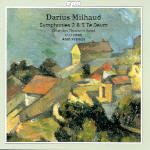This 5-disc box collects for the first time CPO’s Cannes Classical Award-winning series of Milhaud’s complete symphonies featuring the Basel Radio Symphony Orchestra conducted by Alun Francis. Only in today’s blasé market would it be possible for this set to receive so little attention and be received with such general critical indifference. What other major French composer this century completed 12 fascinating, first rate symphonies? If this isn’t a tremendous musical achievement, then what is? Leaving aside, for a moment, the general excellence of the performances themselves, it’s worth exploring why Milhaud’s symphonic achievement has garnered such neglect. Several reasons come to mind.
Milhaud’s symphonies are really difficult to play well. Not only does his polytonal style always sound “wrong” to the players (a genuine clash of clearly defined keys is much more disconcerting in many respects than heavily chromatic or atonal music), but he also loves to oppose very high and very low sounds with nothing in the middle, as in the first movement of his Eighth Symphony. His mature music also is heavily polyphonic (a natural result of its harmonic style), and as a consequence often sounds unrelentingly busy. It is, therefore, difficult to listen to as well–it requires attention and doesn’t work at all as background or ambient music. Folks expecting the popular jazz or Latin influences of such pieces as The Creation of the World or Le Boeuf sur le Toit are in for a big surprise. Though hardly Germanic in a formal sense, these are indeed real symphonies: bold, serious pieces that engage the listener at many different levels.
Finally, Milhaud was a very prolific composer, reaching Op. 441 when he died, and this is always considered to be a liability given our persistently Romantic notion that quality and quantity are somehow mutually exclusive, and that each new work must be a unique masterpiece created from the ground up, as with Mahler’s symphonies, for example, or Wagner’s operas. This is total nonsense. In fact, the 20th century was an exceptionally fertile period full of composers who achieved a consistent musical style and created a vast number of engaging works while remaining comfortably within that style. Stravinsky, Shostakovich, Hindemith, Martinu, Villa Lobos, Cowell, Hovhaness, and even Richard Strauss are just a few of the great names who, along with Milhaud, fit this description to a greater or lesser degree. There’s nothing unusual about a large body of great work at all. Bach and Handel did it, and so did Haydn and Mozart.
The argument that the achievement of the great masters of the past was only possible in “the good old days” but not today, won’t survive 10 seconds of careful listening. No one composed more junk than Mozart, and you’d be hard pressed to find something totally lacking in interest in Milhaud, Stravinsky, or Martinu. Milhaud’s symphonies, within their stylistic parameters, show at least the same range of expression as do, for example, the symphonies of Bruckner or Sibelius. The elements of his style: the pastoral moods, raucous marches, solemn dirges, dance rhythms, strident, soloistic scoring favoring the wind section over the strings–all of these find expression in different ways in each work.
It’s very unlikely that these pieces will find any more persuasive advocates than Francis and his Swiss orchestra–certainly not Michel Plasson and his muddily recorded and rhythmically slack Toulouse orchestra on Deutsche Grammophon. While you may not want to get the whole box at one throw (despite the very reasonable discounted price), if you care about French music or the 20th century symphony (and there’s a lot of evidence that the 20th century was a golden age of the symphony, much more productive than the 19th), then you must hear this music, plain and simple.
































